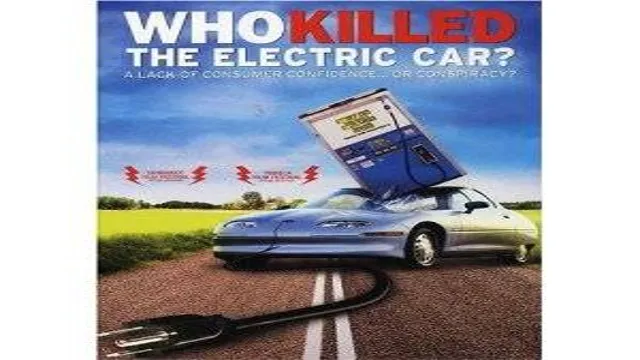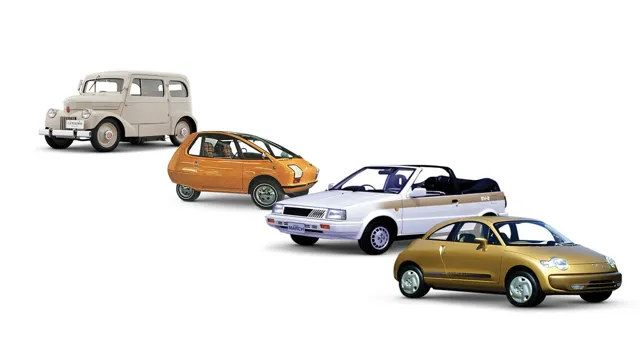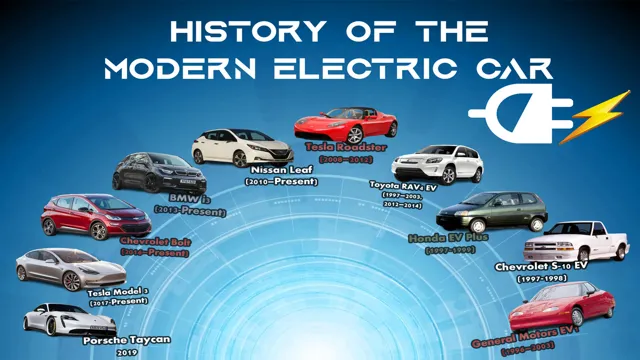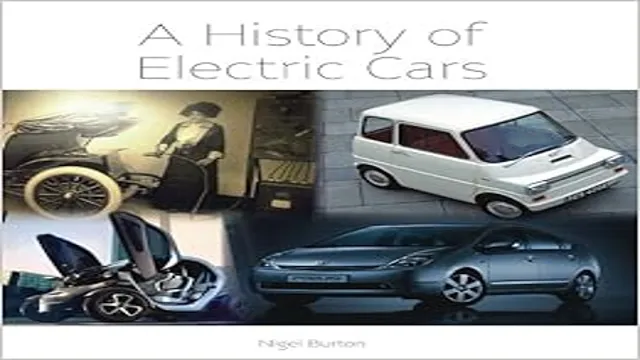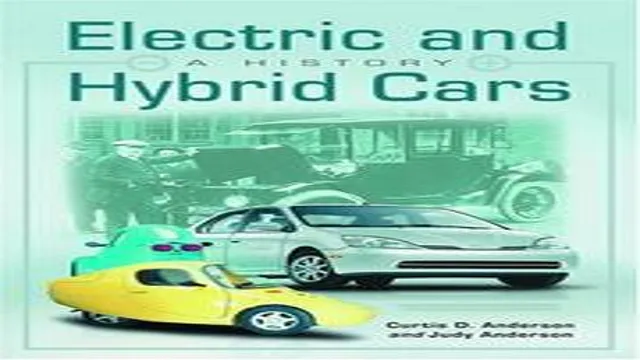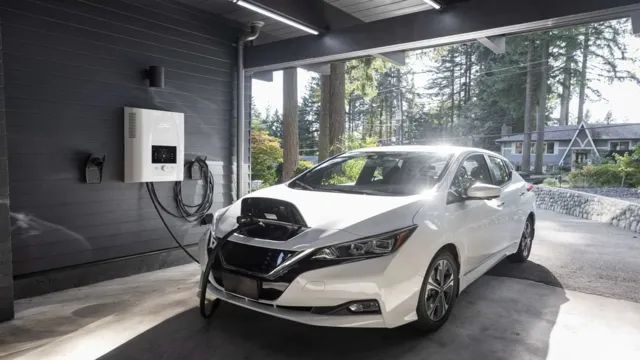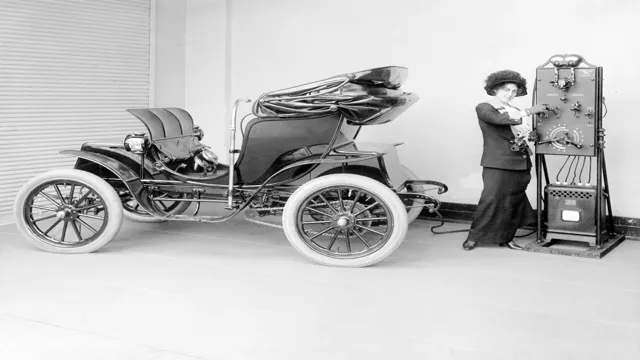The Evolution of Electric Cars: A Look into Their Impactful History
Electric cars are increasingly becoming a popular mode of transportation, boasting eco-friendliness and cutting-edge technology. But did you know that electric cars have been around since the early 1830s? That’s right, the history of electric cars dates back over a century. In 1835, a Scottish inventor named Robert Anderson developed the first crude electric carriage powered by non-rechargeable primary cells.
From there, a handful of inventors and engineers continued to develop electric cars, but it wasn’t until the late 1800s that they gained commercial success. The streets of New York City were filled with electric taxis, leading the way for other cities to follow suit. However, the introduction of the gasoline engine marked the beginning of a decline for electric cars.
Gasoline cars were faster and had longer range, thus, electric cars became more of a niche market for urban commuters. But with the rise of environmental awareness in the 21st century, electric cars have made a comeback. Today’s electric cars not only have longer ranges and higher speeds but also incorporate state-of-the-art technology, providing consumers with a comfortable, efficient, and eco-friendly driving experience.
The history of electric cars may have been slow and rocky, but their future as a prominent mode of transportation is bright.
Introduction
If you thought electric cars were a recent invention, think again! The history of electric vehicles dates back to the late 1800s when inventors were experimenting with battery-powered cars. In fact, the world’s first practical electric vehicle was invented by Thomas Davenport in 183 William Morrison followed shortly, building his version of an electric car in 189
However, it wasn’t until the early 20th century that these cars gained popularity, thanks to the discovery of crude oil. This led to gasoline-powered cars dominating the market, while electric vehicles became limited to niche markets such as the golf course. Fast forward to the 21st century, and electric cars are making a comeback due to their eco-friendliness and advancements in battery technology.
The US Department of Energy is actively working to increase electric vehicle adoption by improving charging infrastructure and expanding funding for research and development. To learn more about the history of electric cars, check out https://www.energy.
gov/articles/history-electric-car.
What are electric cars?
Electric cars are vehicles that run on electricity instead of gasoline or diesel fuel. They use electric motors powered by rechargeable batteries that are typically located under the car’s floor. Electric cars are becoming increasingly popular as people look for ways to reduce their carbon footprint and save money on fuel costs.
Plus, electric cars are much quieter than traditional cars and produce zero emissions, making them better for the environment. Tesla popularized electric cars with its sleek designs and long-range batteries, but now many other automakers are getting in on the action. In fact, electric cars are expected to make up a significant portion of new car sales in the coming years, as consumers become more environmentally conscious and governments around the world encourage the adoption of cleaner transportation.
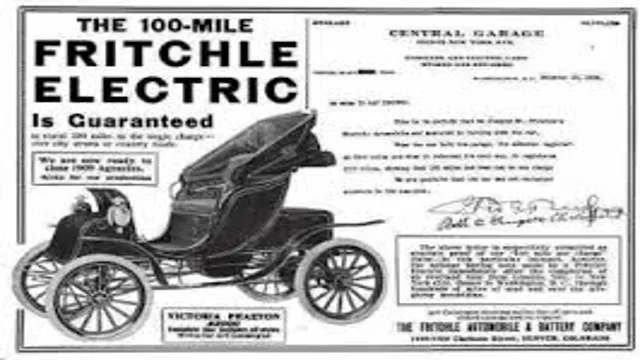
The Early Years
The electric car has a long history, dating back to the early 19th century when inventors first began experimenting with batteries and electric motors. In fact, the first electric car was built in 1837, long before the gasoline-powered car became popular. However, it wasn’t until the early 20th century that electric cars became a viable transportation option for the general public.
The first commercially successful electric car was the Columbia Electric Car, which was introduced in 1897 and quickly became a popular choice for city dwellers. By the early 1900s, electric cars were outpacing gasoline cars in terms of sales, with more than 30,000 electric cars on American roads by the end of the decade. However, the invention of the electric starter motor in 1912 made gasoline-powered cars more convenient to drive, and the subsequent development of cheap gasoline made them more affordable.
As a result, the electric car disappeared from the market for several decades, only to be revived in the 1990s and early 2000s with the introduction of the Toyota Prius and other hybrid and electric models. Today, electric cars are once again gaining in popularity, as concerns about climate change and rising gas prices make them an attractive alternative to traditional vehicles.
First electric car invention
The early years of electric car invention were marked by numerous inventors attempting to create a reliable and efficient electric vehicle. One of the earliest and most significant contributors to this field was Thomas Davenport, an American inventor and blacksmith who created the first working prototype of an electric car in 183 Davenport’s creation was a small, model car that used a battery-powered motor to drive a series of wheels.
While his invention was impressive, Davenport struggled to scale it up for practical use due to the limitations of the batteries available at the time. Despite this setback, Davenport’s work paved the way for countless other inventors to continue building on his ideas and advancing the technology behind electric cars. Nowadays, electric cars are becoming increasingly popular and commonplace, thanks in part to the early pioneers like Davenport who helped bring this technology to life.
Early electric car popularity
In the early 20th century, electric cars started gaining popularity as an alternative to gasoline-powered vehicles. Electric vehicles were cleaner, quieter, and required less maintenance compared to their combustion engine counterparts. They also offered a smoother ride as electric motors provide instant torque.
Cities like New York, Los Angeles, and Chicago had a significant number of electric cars as taxis thanks to their reliability and low running costs. Even famous personalities like Thomas Edison, Ferdinand Porsche, and Henry Ford believed in the potential of electric cars and worked on their development. However, as the cost of gasoline decreased and the efficiency of internal combustion engines improved, electric vehicles lost their appeal, leading to their decline in the automotive market.
Nonetheless, their legacy would live on and influence the development of modern-day electric cars.
Decline of Electric Cars
The history of electric cars dates back to the late 1800s, when electric vehicles were a popular choice among drivers. However, in the following decades, the emergence of gasoline-powered cars overshadowed their popularity, leading to a decline in the production and adoption of electric cars. It wasn’t until the energy crisis of the 1970s that interest in electric cars began to pick up again.
During this time, car manufacturers invested in electric vehicle research and development, resulting in the production of several electric car models. However, this renewed interest was short-lived, and by the early 2000s, electric cars had once again become a niche market. Despite recent advancements and growing concerns about climate change, the adoption of electric cars remains relatively low.
Nevertheless, with increased government support, technological advancements, and greater awareness about environmental issues, the future of electric cars remains promising, and it’s likely that we’ll see their popularity continue to grow in the coming years.
Rise of gasoline-powered cars
Back in the early 1900s, electric cars seemed like the future of transportation. They were quieter, cleaner, and easier to drive than their gasoline-powered counterparts. However, the rise of gasoline-powered cars resulted in the decline of electric cars.
Gasoline cars were cheaper to produce and had a longer range, which meant they could travel further than electric cars. As gasoline cars grew in popularity, the infrastructure to support them, such as gas stations and service centers, began to pop up around the country. Electric cars, on the other hand, required recharging stations, which were not as prevalent.
As a result, people began to favor gasoline-powered cars, and electric cars virtually disappeared from the market. However, as we face new challenges such as climate change and environmental pollution, electric cars have made a comeback. With advancements in technology, electric cars now have longer ranges and can recharge more quickly.
Additionally, governments around the world are offering incentives for people to purchase electric cars. It seems like electric cars may finally have their chance to become the future of transportation.
Decline of electric car usage
The use of electric cars has been on a decline recently. Despite the growing demand for environmentally friendly alternatives, the sales of electric cars have been dropping steadily. Many factors contribute to this trend, including high prices, limited range, and lack of infrastructure for charging stations.
Additionally, the low price of gasoline has made traditional vehicles more attractive to buyers. While electric cars offer benefits such as reduced emissions and lower fuel costs in the long run, the initial investment remains too high for many consumers. Moreover, the lack of range makes it challenging to travel long distances, further detracting from their practicality.
Unless significant improvements are made to increase range, lower costs, and improve infrastructure, it seems that the decline of electric cars may continue for the foreseeable future.
Modern Electric Cars
Modern electric cars have come a long way since the early days of experiments and prototypes. The history of the electric car extends back to the late 1800s but it wasn’t until recent technology advancements that the mass adoption of electric vehicles began. The Energy Department set goals to increase the availability and adoption of electric vehicles and published research on electric car batteries.
With advancements in battery technology and charging infrastructure technology, electric cars have become more mainstream and practical. Not only do they save on fuel costs, but they emit fewer greenhouse gases, providing a more sustainable transportation option. As the market for electric cars continues to grow, prices are expected to decrease, making them more accessible to the average consumer.
The future of sustainable transportation is bright, and electric cars are at the center of it all.
Reintroduction of electric cars in the market
The reintroduction of modern electric cars in the market has been a game-changer in the automotive industry. With the advanced technology and increased demand for eco-friendly vehicles, many major car manufacturers are investing in producing a range of electric cars. These cars not only contribute towards reducing carbon emissions but also offer a smoother and quieter drive, making them appealing to a wide range of drivers.
The keyword “modern electric cars” has become a popular search term in recent years, and for a good reason. These vehicles offer several benefits, including lower maintenance costs and longer driving ranges. With the rapid advancements in battery technology, it is becoming more feasible for people to switch to electric cars as their primary mode of transportation.
The reintroduction of electric cars in the market is paving the way for a greener and more sustainable future, one car at a time.
Government initiatives for electric cars
Electric cars are the future of the automotive industry, and several governments worldwide have initiated steps to promote the adoption of these vehicles. For instance, in the United States, the government offers tax credits up to $7500 for electric car buyers, making it more affordable to own one. Additionally, many states offer rebates and discounted parking and tolls.
In Europe, governments have implemented policies such as establishing charging infrastructure, raising demand for electric cars, and investing in research and development. Some countries, such as Norway, have seen tremendous success in increasing the adoption of electric vehicles, with electric cars accounting for more than half of the country’s new car sales in 2020. In conclusion, the government’s initiatives to encourage electric car usage have proven to be effective, and more governments worldwide are expected to follow suit.
As more people adopt electric cars, the automotive industry will become cleaner and more sustainable, improving the quality of life for everyone.
Future of Electric Cars
The evolution of electric cars can be traced back to the 1800s, but they fell out of favor due to the lower cost and greater convenience of gasoline-powered vehicles. In recent years, however, the push for more sustainable and environmentally friendly forms of transportation has led to a resurgence in electric car popularity. The future looks bright for electric cars, as companies such as Tesla and Chevrolet have introduced high-quality, affordable options to the market.
Additionally, advancements in battery technology are improving the driving range and making electric cars a more practical choice for everyday use. Government incentives and initiatives have also helped to increase the adoption of electric cars. As a result of these factors, it’s likely that electric cars will continue to grow in popularity and become an increasingly common sight on our roads.
For more information, check out the history of electric cars on https://www.energy.gov/articles/history-electric-car.
Advancements in electric car technology
The future of electric cars is looking brighter than ever before with the constant advancements in technology. One of the most significant challenges for electric vehicles has been the limited range of travel due to battery life. However, recent advancements in battery technology have made electric cars go farther without needing to be charged.
For instance, the Tesla Model S Plaid+ is believed to be able to travel more than 500 miles on a single charge, which is a significant improvement from previous models. Additionally, electric cars’ charging times have been reduced drastically, making charging stations more accessible and allowing drivers to spend less time waiting for their EVs to charge. With these advancements, electric cars are proving to be a practical alternative to traditional combustion engine vehicles.
Electric vehicles’ future seems bright as new technology enables longer battery life and shorter charging times, making EVs a more affordable and convenient option for drivers, ultimately reducing fossil fuel consumption and pollution.
Impact of electric cars on the environment
Electric cars are a promising future for sustainable transportation. With the world striving towards reducing carbon emissions, electric vehicles are seen as a key player in reducing carbon footprints in the transportation industry. There is no doubt that the impact of electric cars on the environment is significant, with reduced emissions and improved air quality being the major benefits.
However, the future of electric cars is still facing some challenges. While the demand for electric cars is increasing, there is still a lack of infrastructure to support it. The battery technology still needs to improve, as there are concerns about the environmental impact of mining for the necessary materials.
But, with the advancement in technology, the future of electric cars looks promising. As more advancements are being made, it won’t be long before electric cars become the standard for sustainable transportation. The transition to electric cars may not be immediate, but it’s a step in the right direction towards a greener and cleaner future.
Potential for electric car expansion
The future of electric cars looks increasingly bright, as more and more people are switching to these environmentally friendly vehicles. With advancements in technology and government incentives, the potential for electric car expansion is vast. For example, the UK government recently announced plans to ban the sale of new petrol and diesel cars by 2030, which will likely drive up demand for electric vehicles.
The infrastructure for electric cars is also improving, with more charging stations being installed across the country. While the cost of electric cars remains relatively high compared to traditional vehicles, this is expected to decrease as production increases and technology improves. Overall, the potential for electric car expansion is huge, and it’s likely that we’ll see many more of these vehicles on the road in the coming years.
Conclusion
In conclusion, the history of the electric car is a story of persistence, innovation, and ultimately, a triumph of sustainability over traditional fossil fuel-powered vehicles. From the early experiments in the early 19th century, through the ups and downs of the 20th century, to the current electric car revolution, we have seen the potential of this technology for reducing emissions and improving the environment. As we look to the future, it is clear that the electric car is here to stay, and it will continue to change the way we think about transportation in exciting and innovative ways.
So, let’s charge up, buckle up, and get ready for the ride of our lives!”
FAQs
What is the history of electric cars?
Electric cars have been around since the 1800s, with developments in battery technology leading to more practical models in the early 1900s. However, it wasn’t until the 21st century that electric cars really began to gain traction in the consumer market.
How have electric cars developed over time?
Electric cars have undergone significant development since their inception, with advances in battery technology, motor efficiency, and charging infrastructure. Modern electric cars can offer ranges of over 300 miles per charge and can charge in as little as 30 minutes.
Why are electric cars important for the environment?
Electric cars produce zero emissions at the tailpipe, meaning they do not contribute to air pollution or greenhouse gas emissions. This makes them an important tool in combating climate change and improving air quality in urban areas.
What is the future of electric cars?
The future of electric cars looks bright, with major automakers investing heavily in the technology and many countries implementing policies to encourage their adoption. It is expected that electric cars will continue to become more practical, affordable, and commonplace in the coming years.

